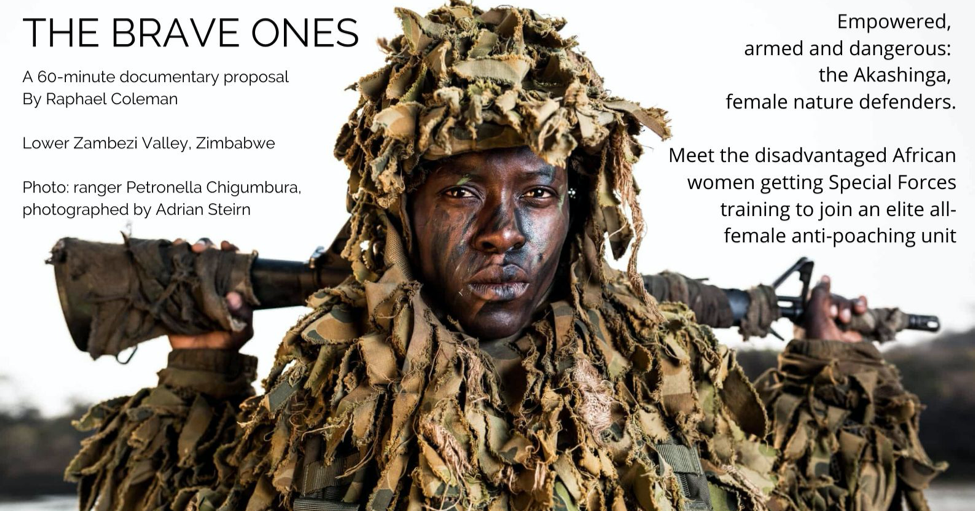FILM PROPOSAL

Interest:
THE SETUP – Africa is losing the war on poaching. Previous investigations have revealed a dire state of affairs for the continent’s wildlife. Impoverished but often military-trained poacher syndicates kill and sell animals to international criminal gangs, which operate with impunity by bribing police and corrupt government officials. Even some of the anti-poaching rangers, who form the frontline against wildlife crime, are being paid off to give information to criminals. To combat this ever-worsening extinction threat, new tactics are needed.
THE PROTAGONIST(S) – We meet Anna, a local young woman from the Shona ethnic group. She’s applied to join the Akashinga (the ‘Brave Ones’), an experimental all-female armed anti-poaching unit in Zimbabwe. Like many other candidates, Anna comes from a disadvantaged background: the Akashinga are recruited from orphans, sexual and violent abuse survivors, wives of imprisoned poachers, and unemployed single mothers. We listen to Anna and others to understand the situations they come from, and why they’re taking on this radical challenge.
THE CONFLICT – We follow Anna’s progress as the candidates undergo gruelling physical and mental training by ex-Special Forces personnel that most men fail to complete. Despite many scorning that anti-poaching is a “man’s job” that women can’t handle, Anna will learn unarmed combat, tracking, survival skills, and weapons-handling to take on this tough and dangerous role.
Anna passes the course with several other candidates – but the odds are still stacked against them. Together they go on to tackle bushmeat and elephant poaching, protecting Zimbabwe’s wildlife from organised criminal networks. We follow their everyday work in the bush to see the risks they take, navigating around dangerous game, dismantling snares and arresting poachers. We hear how the job’s difficulties affect their personal lives. We learn what they know and love about the bush that drives them to protect nature so fiercely.
THE RESOLUTION – Study results show the Akashinga’s staggering success rate at tackling wildlife crime – even though most of their work is achieved without firing a single shot. We dig deeper to understand why. The women don’t drink, eat a traditional vegan diet, appear to be incorruptible, and are far better than men at gathering community intelligence on poaching syndicates. They use their knowledge of local people’s habits and their communication skills to de-esclate conflicts. They conduct arrest raids in the dead of night on Sunday mornings, when sleeping hungover criminals least expect them.
But the programme’s effects don’t end with the poachers or the wildlife. The women use their salaries to buy land, provide food and afford education for themselves and their families – and we see how Anna’s life is improving. By re-investing in their communities, the rangers are bringing greater benefits to local economies than poaching, trophy hunting or male anti-poaching units.
CONCLUSION – By persisting against social barriers and succeeding in their training, Anna and her colleagues have come from harsh pasts to becoming role models and pillars of their community. The battle against poaching continues, but with the Akashinga on their side, the elephants can recover. Now, nature and people begin to flourish together once again in the Zambezi Valley.
Qualifications
Raphaël is a wildlife biologist who has studied and worked in human-wildlife conflict and environmental crime zones. His previous work has focussed on the links between human/animal behaviour and conservation problems, such as climate change, poaching and wildlife trafficking.
Empowered, armed and dangerous: meet the disadvantaged African women getting Special Forces training
to join an elite anti-poaching unit on the frontline against wildlife crime.
A 60-minute documentary proposal
by Raphaël Coleman
Location(s):
Lower Zambezi Valley, Zimbabwe
This was the documentary Raph was researching when he joined Protrack’s anti-poaching course in South Africa, the organisation that trained some of the wildlife protectors who would have featured in the film.

 Zara Rich
Zara Rich